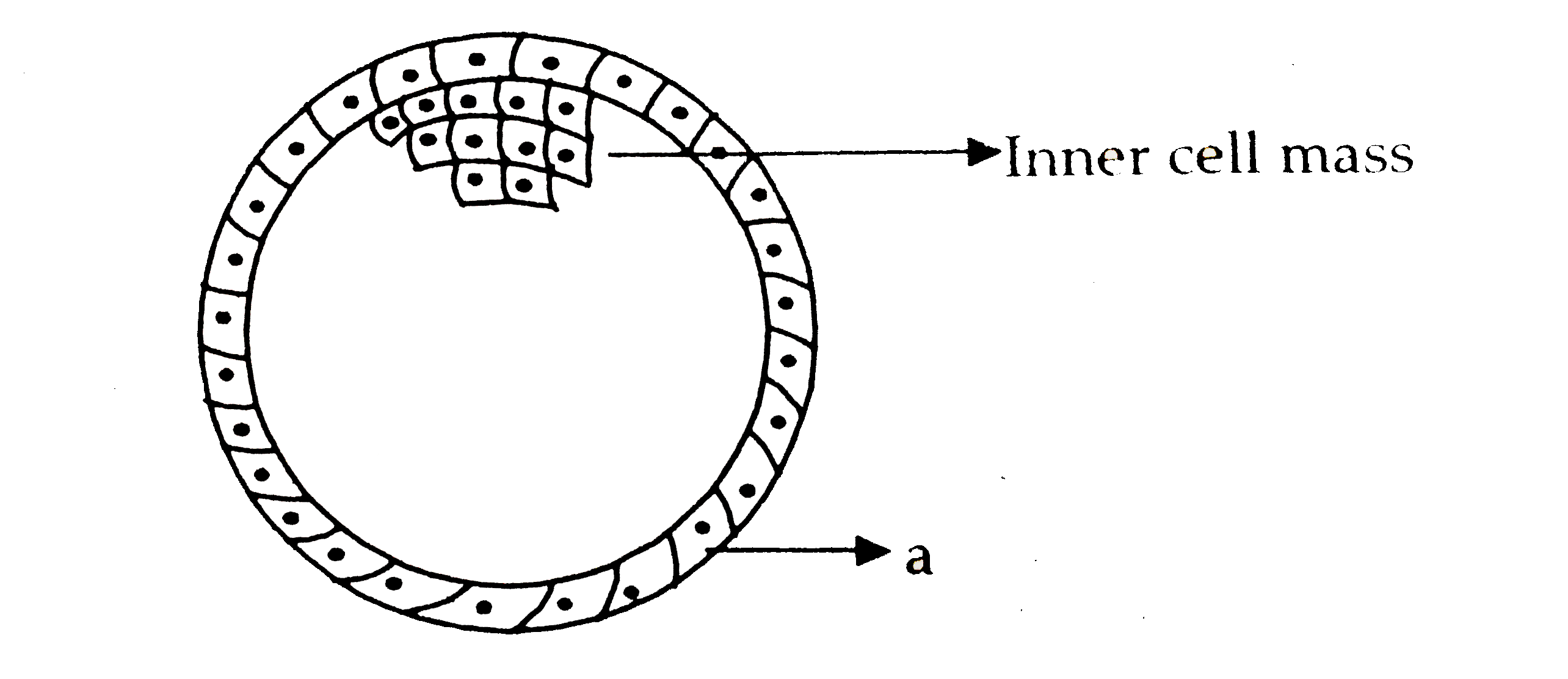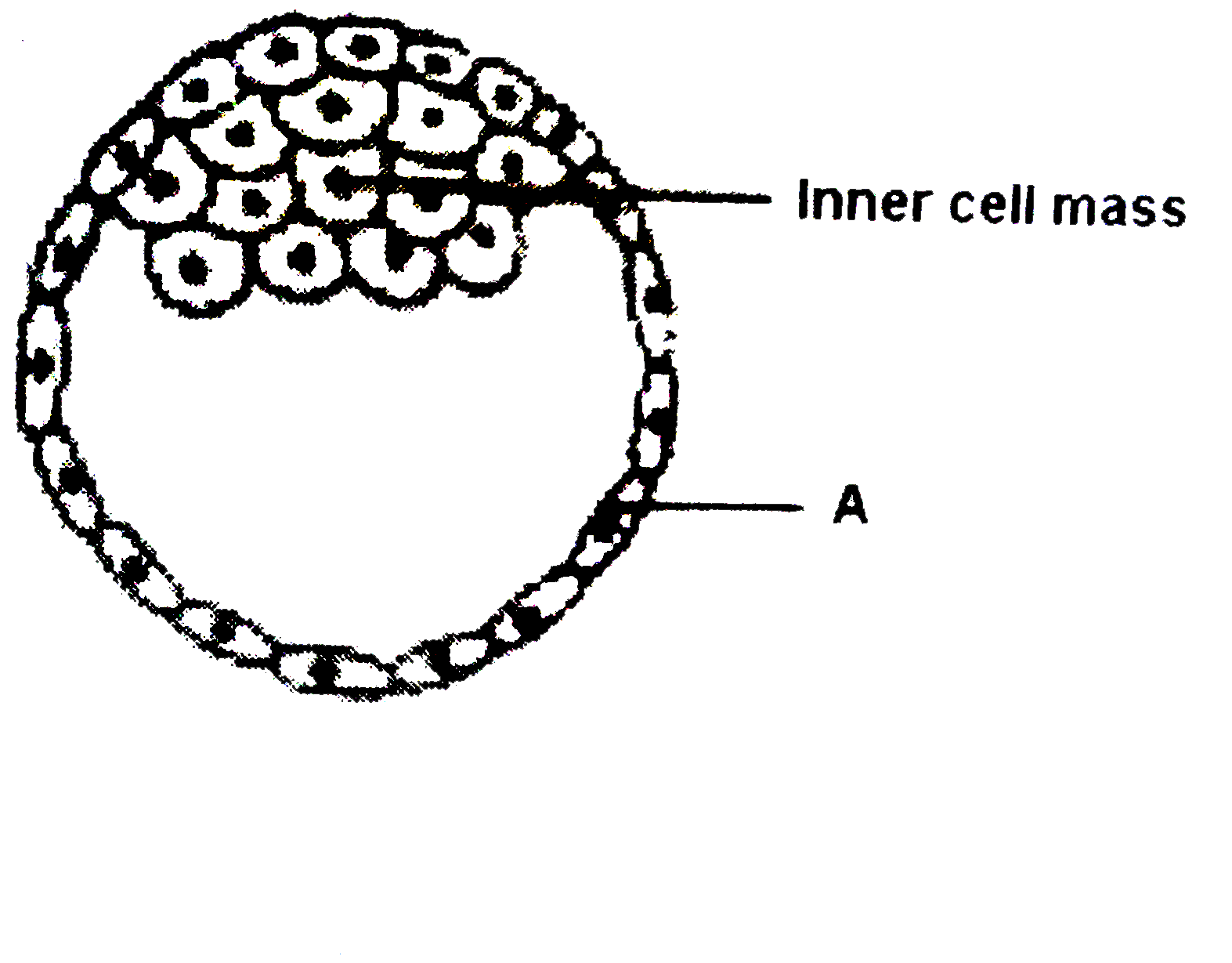Arrange the terms given below in their orthir order of occurrence describing their ructure and function in the earloy development of the humn embryo: Implantation, cleavage, inner cell mass, trophoblastl, blastomeres, endometrium, morula, blastocyst,
1. Cleavage.
2. Blastomeres.
3. Morula.
4. Blastocyst.
5. Trophoblast.
6. Inner cell mass
7. Endoetrium. ltbtgt 8. Implantation.
Topper's Solved these Questions
- XII BOARDSBook:XII BOARDS PREVIOUS YEARChapter:XII BOARDSExercise:DELHI BOARD : SET-II SECTION-A
Explore 2 Videos
- XII BOARDSBook:XII BOARDS PREVIOUS YEARChapter:XII BOARDSExercise:DELHI BOARD : SET-II SECTION-B
Explore 5 Videos
- XII BOARDSBook:XII BOARDS PREVIOUS YEARChapter:XII BOARDSExercise:[SET -I] [Comptt.] SECTION-D
Explore 1 Video
- SAMPLE PAPER 2019Book:XII BOARDS PREVIOUS YEARChapter:SAMPLE PAPER 2019Exercise:Section E Part B
Explore 3 Videos
Similar Questions
Study the figure given below and answer the questions that follow :
Name the stage of human embryo the figure represents
Identify 'a' in the figure and mention its function.
Mention the fate of the inner cell mass after implantation in the uterus
Where are the stem ceHs located in this embryo?

View SolutionStudy the figure given below and answer the questions that follow :
(a)Name the stage of human embryo the figure represents.
(b)Identify 'A' in the figure and mention its function .
( c )Mention the fate of the inner cell mass after implantation in the uterus .

(d)Where are the stem cells located in this embryo ?
View Solution
Knowledge Check
Read the passage and answer the questions:
Implantation is the embedding of the blastocyst into the endometrium of the uterus. Blastocyst is a ball of cells with a large, fluid-filled cavity called the blastocoel. The blastomeres in the blastocyst are arranged into an outer layer called trophoblast and inner cell mass. With the formation of blastocoel, morula is converted to blastula which is called blastocyst in mammals.
The ectoderm cells will form the........ASkeletal systemBNervous systemCExcretory systemDRespiratory systemRead the passage and answer the questions:
Implantation is the embedding of the blastocyst into the endometrium of the uterus. Blastocyst is a ball of cells with a large, fluid-filled cavity called the blastocoel. The blastomeres in the blastocyst are arranged into an outer layer called trophoblast and inner cell mass. With the formation of blastocoel, morula is converted to blastula which is called blastocyst in mammals.
State of embryo development, in which implantation occurs in human female is:AMorulaBZygoteCBlastocystDTransient 3-celled stageRead the passage and answer the questions:
Implantation is the embedding of the blastocyst into the endometrium of the uterus. Blastocyst is a ball of cells with a large, fluid-filled cavity called the blastocoel. The blastomeres in the blastocyst are arranged into an outer layer called trophoblast and inner cell mass. With the formation of blastocoel, morula is converted to blastula which is called blastocyst in mammals.
Assertion (A): Blastocyst undergoes gastrulation to form three germinal layers.
Reason (R): This involves cell movements (morphogenetic movement) that help to attain new shape and morphology of embryo.ABoth assertion (A) and reason (R) are true and reason (R) is the correct explanation of assertion(A).BBoth assertion (A) and reason (R) are true but reason (R) is not the correct explanation of assertion (A).CAssertion (A) is true but reason (R) is false.DAssertion (A) is false but reason (R) is true.
Read the passage and answer the questions:
Implantation is the embedding of the blastocyst into the endometrium of the uterus. Blastocyst is a ball of cells with a large, fluid-filled cavity called the blastocoel. The blastomeres in the blastocyst are arranged into an outer layer called trophoblast and inner cell mass. With the formation of blastocoel, morula is converted to blastula which is called blastocyst in mammals.
The process that transforms the embryo into a three-layered stage is called.....
View SolutionRead the passage and answer the questions:
Implantation is the embedding of the blastocyst into the endometrium of the uterus. Blastocyst is a ball of cells with a large, fluid-filled cavity called the blastocoel. The blastomeres in the blastocyst are arranged into an outer layer called trophoblast and inner cell mass. With the formation of blastocoel, morula is converted to blastula which is called blastocyst in mammals.
Which organ is formed during gastrulation ?
View SolutionAssertion: During implantation, the trophoblast layer gets attached to the endometrium.
Reason: The inner cell mass of the blastocyst gets differentiated as embryo.
View SolutionAssertion: The embryo with 8 to 16 blastomeres is called a morula.
Reason: The blasometeres in the morula are arranged into an outer layer called trophoblast and an inner group of cells attached to trophoblast called the inner cell mass.
View Solutiongiven below are four statements (i)-(iv) reagarding embryonic development in humans.
(i). Cleavage divisions about considerable increase I the mass of protoplasm
(ii). With more cleavage divisions, the resultant blatomeres become smaller and smaller.
(iii). the blastomeres in the blastocyst are arranged into two layers, trophoblast and endometrium.
(iv). Cleavage divisions result in a solid ball of cells called morula.
Which of the above two statemetns are correct?
View Solution
